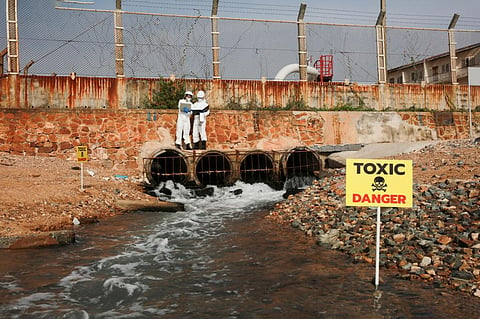

The member nations of the World Health Organization (WHO) May 29, 2023 accepted a draft resolution on the impact of chemicals, waste and pollution on human health during the 76th World Health Assembly.
WHO was urged to work jointly with the United Nations Environment Programme and update the State of the Science of Endocrine Disrupting Chemicals 2012 report. This is to be prepared and submitted before the sixth session of the United Nations Environment Assembly to be held from February 26-March 1, 2024.
People are exposed to chemicals daily, resulting in childhood death, illnesses and disability, particularly in developing countries, the representatives of the member states said. But data on chemical exposures and consequent health concerns is limited, they added.
Therefore, the resolution encouraged the health sector to develop a regulatory framework, national human biomonitoring and surveillance programmes to track chemicals of concern such as cadmium, lead, mercury, highly hazardous pesticides and endocrine-disrupting chemicals.
Countries should develop policies, capacity building and technology to identify potential risks in certain territories and populations to implement the measure, the proposal document noted.
WHO should report on the implementation of this resolution in the next two assembly sessions in 2024 and 2025 respectively, it added. Also, progress reports to the Health Assembly should be submitted in 2027 and 2029, the proponents noted.
The draft sought to make the assembly aware of the fact that waste generated from chemicals will only increase over the coming years. The authors expressed concern over the poor management of chemical waste and how it will have a long-term effect on human health, particularly increasing the prevalence of non-communicable diseases.
The resolution asked member countries to address “the linkages between chemicals, waste and pollution and other health priorities at the domestic and international levels, such as maternal and child health, antimicrobial resistance, and the importance of identifying, preventing and addressing environmentally related disease in Universal Health Coverage”.
The authors also requested the WHO director-general to “publish a report, incorporating science and risk based-assessments and conclusions on the human health implications of chemicals, waste, and pollution as well as reporting on existing data gaps, including from a One Health approach”.
The data collected should be arranged by sex, age, disability, the report noted. It should also take into account substances that are carcinogenic, mutagenic or reprotoxic, neurotoxic, immunotoxin or harmful to cardiovascular, respiratory and other organ systems, or endocrine disruptors, it added.